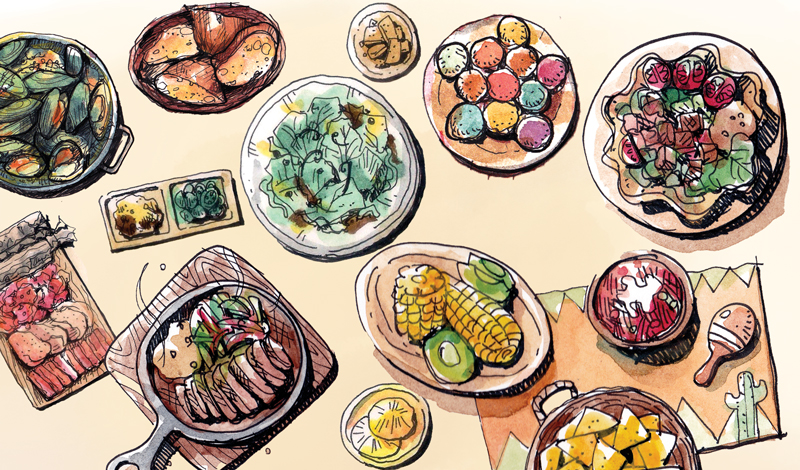This series highlights how Buddhism can enhance daily living. As Nichiren Daishonin says: “When the skies are clear, the ground is illuminated. Similarly, when one knows the Lotus Sutra, one understands the meaning of all worldly affairs.”[1]
It’s November, and the year is almost over! Spring is often a time for picnics, summer for barbecues, the start of fall for back-to-school gatherings and now ’tis the season for holiday parties.
The sharing of food helps us deepen existing bonds and form new ones. While there are many ways to enjoy the pairing of good food and company, a potluck is arguably one of the most popular.
The word potluck first appeared in 16th-century works by English author Thomas Nashe. The word meant offering whatever food was available—“the luck of the pot”—when an unexpected guest stopped by.[2]
More recently, in the U.S., potlucks emerged and gained popularity during the Great Depression of the early 1930s, almost out of necessity, to share limited food resources.
Nowadays, potlucks serve as delightful opportunities to break bread and the ice, with the food as easy conversation starters. Oftentimes, stories behind the dishes people bring spark chats about family, interests, memories, work and other things.
Eating Together Is Good for Our Health, Well-Being and Relationships
As we eat, share stories and laugh together, such joyful interactions trigger endorphins (hormones that boost our mood and sense of well-being) that help people connect and feel closer.
One study indicates that socializing over food in the evening is especially effective for fostering bonds of friendship, perhaps due to fewer time constraints than morning or afternoon meals.[3] Other research shows that after sharing even one meal, levels of social bonding and cooperation are higher in chimpanzees, bonobos and humans.[4]
Kevin Kniffin, an assistant professor at Cornell University, led a team-building study that found that firefighters who prepare meals and eat together perform better as a group. Kniffin observes, “From an evolutionary anthropology perspective, eating together has a long, primal tradition as a kind of social glue.”[5] Through meal sharing, it seems, our ancestors fostered greater cooperation and smoothed out rough edges resulting from living and working in close quarters.
Breaking bread with others enables us to enjoy their company while also experiencing physical and mental health benefits.
Results from a September 2022 American Heart Association survey of 1,000 U.S. adults show that having meals with others reduces stress. Ongoing stress can lead to an increased risk of heart disease and stroke.
The survey found that “67% of respondents acknowledged that sharing a meal reminds them of the importance of connecting with other people, and 54% say it reminds them to slow down and take a break.”[6] In addition, 59% of those surveyed said that when eating with others, they make healthier food choices.
‘Food Livens the Complexion’
Buddhism teaches that we are all interconnected at the deepest level, and appreciating and fostering our connections is a crucial aspect of Buddhist practice.
Nichiren Daishonin often began letters to his disciples by expressing gratitude for their offering of food and other goods. Acknowledging the benefits we gain from supporting others, he writes:
Food livens the complexion, gives one strength, and prolongs life. …
When one lights a torch for someone at night, one brings light not only to another person but to oneself as well. Likewise, when one livens other people’s complexions, one livens one’s own too, when one gives them strength, one gives oneself strength too, when one prolongs their lives, one prolongs one’s own life as well. (“On Clothing and Food,” The Writings of Nichiren Daishonin, vol. 2, p. 1066)
The generosity of heart to support others sparks mutual growth, development and fulfillment. Whether it’s sharing a meal, chanting or studying with a fellow member, or sharing Buddhism with a friend, our efforts to care for others benefits and brightens our own lives.
With SGI-USA’s focus in 2025 on growing our friendships, communities and successors to expand our kosen-rufu movement, this might be the perfect time to find various ways to deepen bonds with our family, friends and neighbors and lead happier, more fulfilling lives.
—Prepared by the SGI-USA Study Department
November 8, 2024, World Tribune, p. 10
References
- The Object of Devotion for Observing the Mind,” The Writings of Nichiren Daishonin, vol. 1, p. 376. ↩︎
- See blog.hmns.org/2016/11/the-potluck-a-
native-american-thanksgiving-tradition/ <accessed on Oct. 29, 2024>. ↩︎ - See researchgate.net/publication/314665691_Breaking_Bread_the_Functions_of_Social_Eating <accessed on Oct. 29, 2024>. ↩︎
- See psychologytoday.com/us/blog/wild-connections/201911/the-upside-eating-together <accessed on Oct. 29, 2024>. ↩︎
- See news.cornell.edu/stories/2015/11/groups-eat-together-perform-better-together <accessed on Oct. 29, 2024>. ↩︎
- See newsroom.heart.org/news/new-survey-91-of-parents-say-their-family-is-less-stressed-when-they-eat-together <accessed on Oct. 29, 2024>. ↩︎
You are reading {{ meterCount }} of {{ meterMax }} free premium articles

